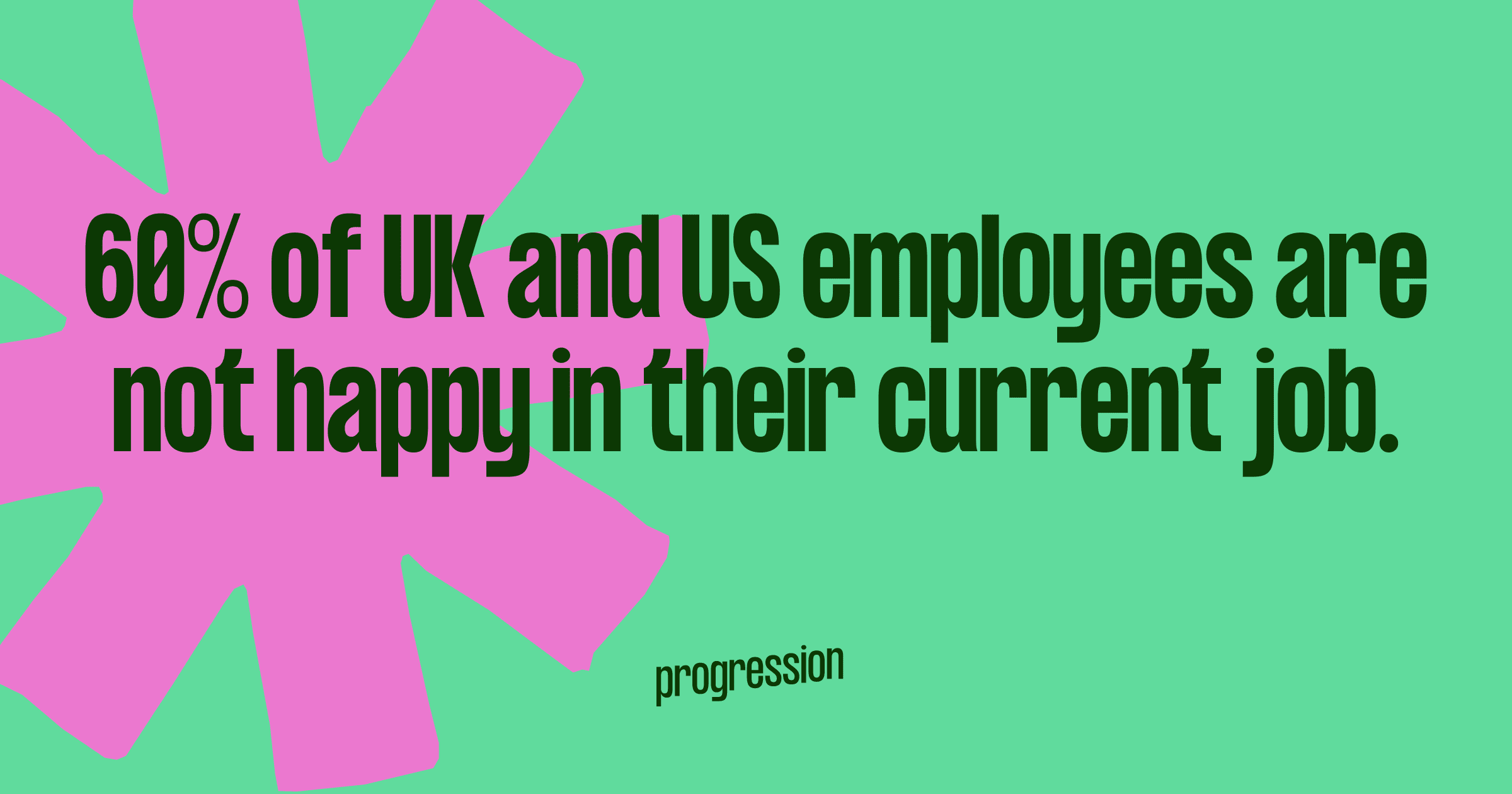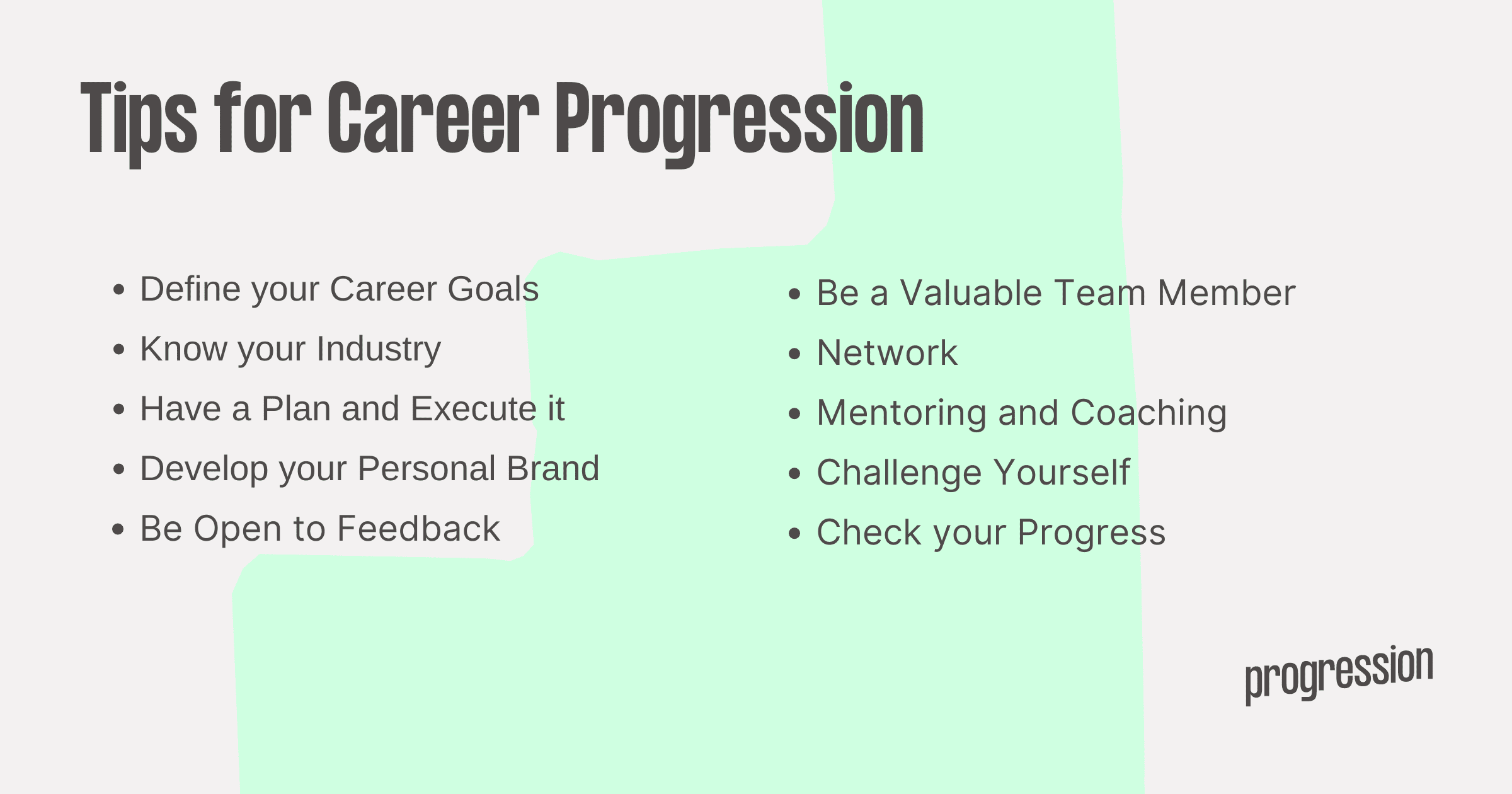Imagine this scenario: You’ve landed yourself a job in the industry you want to work in. You were asked in your interview where you see yourself in five years' time, but once you’ve started your new job, the next step on your career journey is the last thing on your mind. Before you know it, you’ve been in the exact same position for years without any opportunity to grow.
Luckily, there’s a way to avoid this fate. Career progression can help you shape your career identity and embark on an exciting career journey brimming with opportunity. If you’re not sure where to start, we’ve put together the ultimate guide to career progression, filled with tips and tricks to help you maximise your potential. With a little guidance, you can change your dream job from a far-off fantasy into a logical plan.
What is career progression?
You can probably guess what the idea of career progression involves. Phrases like ‘climbing up the corporate ladder,’ or ‘working your way up’ may spring to mind, but career progression can mean a lot more than just getting promoted. Career progression means that as you gain more experience and expertise in your chosen field, you will earn more opportunities and responsibilities. We know not everyone is an aspiring executive or director, so career progression should be more focused on unlocking every individual’s potential and opening doors they may not have considered before.
Why is career progression important?
You may have been under the impression that if you turn up to work every day, do your time and put in a little extra effort, after a few years opportunities will be dropped in your lap. The old-fashioned way may have worked for the older generation, but when it comes to maximising your potential, you can’t just wing it. Planning your career progression is essential for gaining new opportunities.
If you want to broaden your horizons and possibly take your career in a new direction, career progression can help you gain a broader skill base. You could develop laterally, branching out into new departments or taking on different responsibilities, or you could choose to hone in on specific skills with specialised training and development. So whether your career path has a laser focus or you’re taking time to explore opportunities, a career progression plan kickstarts that journey.
If you’re looking to improve your earning prospects (and hey, who isn’t) having a career progression plan in place may help unlock earning potential. This could be through promotions or lateral career moves to other departments or companies. On the flipside, career progression can provide you with flexibility and options which act as a career safety net.
Salaries and prestige aside, career progression is an important contributor to your overall job satisfaction. Even if your line of work is project-based with short term deadlines and goals, being able to envision your career journey can help spur you on – even on the dreariest of Mondays. As of 2019, a study found that only 64% of UK employees are happy in their current job. A career progression plan can help you out of a rut or period of stagnation instead of settling for second best.

Tips for career progression
Wondering how to go about creating a career progression plan for yourself? Here’s how to do it.
Define your career goals
Take some time to think about what you want from your career. Everyone’s priorities and strengths are different, so try and evaluate what aspects of your career are most important to you. Although having a clear idea of what you want to achieve is useful, your career goals may evolve and change over time.
Know your industry
In order to maximise your potential and get ahead, you’ll need to know the ins and outs of your chosen industry. You may work in digital marketing for a tech company, but aren’t necessarily a tech expert yourself. Familiarising yourself with an entire industry may seem daunting, but you can make simple changes such as following industry insiders on social media and keeping up with news. Knowledge of the industry you work in as a whole will also help you understand where you want your career to take you – there are new niches and specialisms waiting to be discovered.
Have a plan and execute it
Career progression should be guided by an ambitious, adaptable and achievable plan with short and long-term goals. A good plan won’t just consist of one long term goal you want to reach in five years’ time. Instead, your career progression should include short term milestones with a degree of flexibility. A career progression plan should also establish the skills and experience required to get you where you want to go. By including these, you’ll eliminate some obstacles that may have stood in your way or thrown you off course.
Develop your personal brand
A key aspect of career progression is shaping your career identity, and we’ve seen the importance of personal branding skyrocket over the last decade. Developing your personal brand means considering how employers, colleagues and clients perceive you. Consider how your strengths and specialisms come across and what kind of employee you want to be.
Be a valuable team member
We all know hiring managers look for ‘team players’ when recruiting, but we often forget how far that quality can take us. Being an asset to your team will allow you to learn as much as possible as well as giving your sense of job satisfaction a healthy boost. Demonstrating you’re an adaptable, cooperative team member could also open up opportunities for you further down the line. Once you’ve earned that ‘team player’ reputation, you can adapt to new challenges and responsibilities.
Be open to feedback
A huge part of career progression is working out which parts of your job suit you. However, it can be difficult to evaluate your own strengths and weaknesses. Feedback helps you understand what you’re doing well and what you can improve. Instead of viewing feedback from coworkers or managers as criticism, think of it as an opportunity to set, or keep track of, progression goals.
Network
It may be tempting to roll your eyes at the adage ‘it’s not what you know, it’s who you know’ but the chances are you’ve already benefited from some form of networking to get where you are today. You don’t need to be a first class schmoozer to network – even keeping contact with previous employers or colleagues is a form of networking.
Mentoring and coaching
As well as networking, career progression can be enhanced through mentoring and coaching. It is now pretty commonplace for companies to have a mentoring system for new employees, but mentoring doesn’t have to stop there. Reaching out to managers and colleagues for help (be it informal advice or more formal training) not only develops your skills but strengthens your working relationship as well.
Challenge yourself
Ultimately, if you have a career progression goal you want to achieve, you’ll need to push yourself. If you want to demonstrate your capability in a certain area, you’ll need to ask your managers for more responsibility. If you want mentoring or training, you’ll need to be proactive and reach out to your colleagues. If you really want to go above and beyond your peers, you will have to be the driving force of your career progression.
Check your progress
Just as you would keep track of all your projects’ progress in the workplace, you should keep track of your career progression too. Take some time once a year to look back on how far you’ve come and ask yourself these questions:
- Am I on track?
- Did I achieve the objectives I set for this year?
- Have I gained any skills, achievements or experience that will help me progress my career?
- What do I want to achieve next?

How to discuss career progression
So we know that career progression means being proactive and seizing as many opportunities as possible, but how can we actually put it into action? Here are some tips on how to discuss career progression with your HR department or managers. If you stick to these, discussing career progression will strengthen your working relationship and demonstrate just how much of an ambitious, adaptable employee you are. It’s really not as intimidating as it seems!
Establish your unique value
When bringing up the subject of career progression, you should make it clear to your hiring managers what an excellent employee you are. Think about what sets you apart from your colleagues and where you particularly thrive. You’ll have to do a little more than just showing up on time.
Know your options
If you want to move into a new position, you’ll need to research exactly how that can be put into practice in your workplace. There’s no use pining for a position that doesn’t need filling. Review the company's hierarchy, structure and open positions to see where a logical next step may be.
Set the tone
Discussing your career progression should never be off the cuff – you’ll want to do a little preparation. Set a meeting with your hiring managers yourself rather than waiting for them to come to you. You should have a clear idea of what you want to do as a next step with the organization before going into the meeting.
Prepare questions
Don’t be afraid to ask some questions you may feel a little uncomfortable asking. Salary negotiation and long term plans may feel strange to ask about in conversation, but a good employer will always take your queries seriously. Your ability to negotiate uncomfortable subjects in a professional manner will impress your managers too.
Describe your vision
Let your managers know where you see yourself in one, three and five years’ time. Your career progression shouldn’t be set in stone, but showing you’ve carefully thought about your future will show your employers you take your career journey seriously. Don’t be afraid to be direct and to the point.
Be open to feedback
Career progression should be a discussion, meaning there will be an ongoing dialogue between you and your employer as you progress. Feedback from your employer can help you revise and perhaps rethink the specifics of your career progression plan.
Follow up
Just as your career progression is an ongoing journey, the discussion of your career progression should be an ongoing project. Your employer should be able to check in with you to discuss progress and keep you on track.
Common career progression questions
For some more guidance on career progression, here are some common questions you may need to ask yourself:
- How do I ask for a promotion?
- How do I ask for a job title change?
- How can I determine which career direction to pursue?
- What can I do to best prepare myself for my next career move?
- How can I measure my career progression easily
Planning out a long term career plan may seem daunting, but career progression is about taking little, achievable steps towards your career goal rather than overcoming huge obstacles. Whatever your end goal, every time you develop a new skill or take on a new responsibility, you are still helping shape your career journey.
A big aspect of career progression is reaching out to your managers to aid development, but doing your own reflection, analysis and tracking your progress is even more important. Of course your employers should encourage your career progression but ultimately, setting yourself long term and short term goals, analysing your strengths and improving on your weaknesses are all in your own hands.
With our ultimate guide to career progression, go forth and conquer.










 Sign up with Google
Sign up with Google  Sign up with Email
Sign up with Email